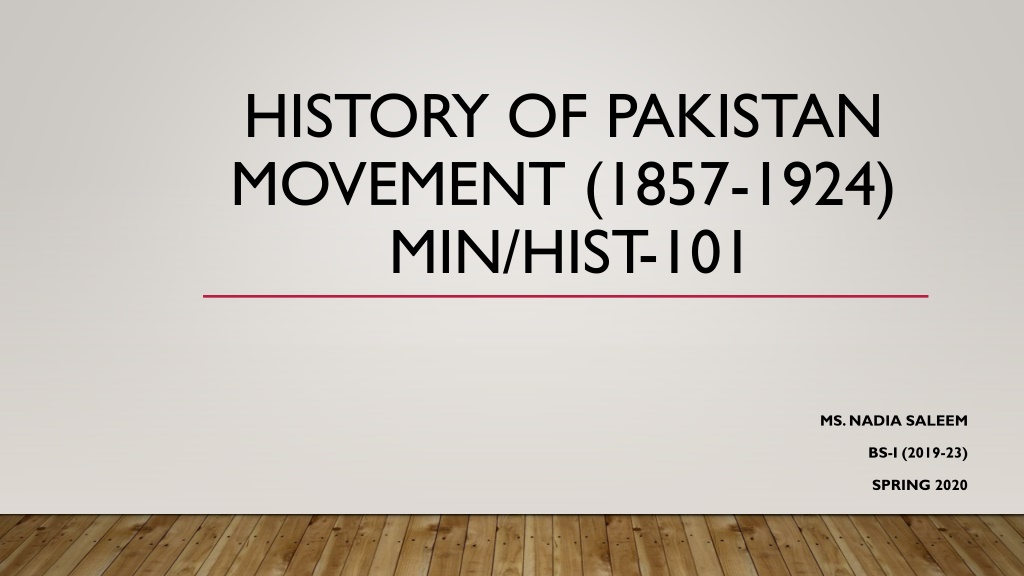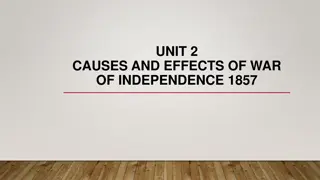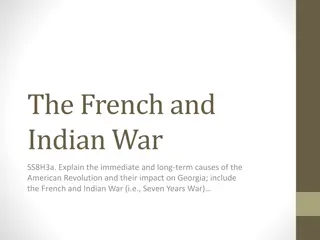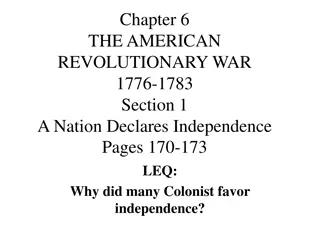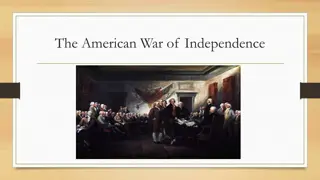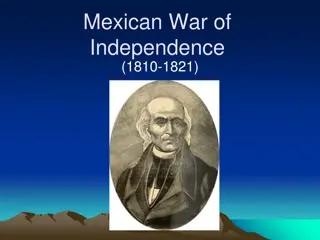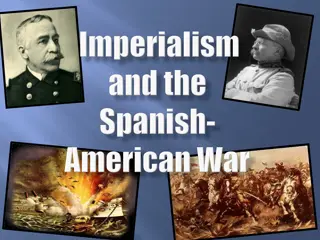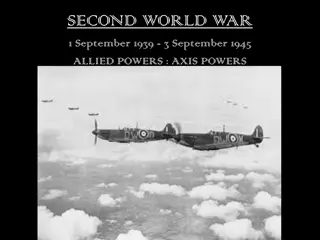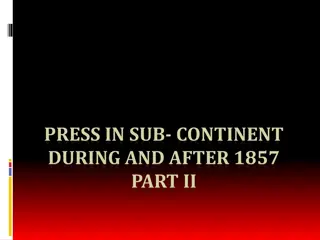War of Independence 1857: Causes, Impact, and Failure
The War of Independence in 1857 was a pivotal moment in the history of the Indian subcontinent, fought against British domination. Despite efforts by Indians, including issues of conflict and lack of leadership, the war ultimately failed due to various political, social, religious, military, and economic causes.
Download Presentation

Please find below an Image/Link to download the presentation.
The content on the website is provided AS IS for your information and personal use only. It may not be sold, licensed, or shared on other websites without obtaining consent from the author.If you encounter any issues during the download, it is possible that the publisher has removed the file from their server.
You are allowed to download the files provided on this website for personal or commercial use, subject to the condition that they are used lawfully. All files are the property of their respective owners.
The content on the website is provided AS IS for your information and personal use only. It may not be sold, licensed, or shared on other websites without obtaining consent from the author.
E N D
Presentation Transcript
HISTORY OF PAKISTAN MOVEMENT (1857-1924) MIN/HIST-101 MS. NADIA SALEEM BS-I (2019-23) SPRING 2020
UNIT 1 WAR OF INDEPENDENCE 1857 1.1 NATURE AND CAUSES
NATURE OF THE WAR Mutiny or Independence movement? It was Mutiny in the opinion of British as they were in the ruling power and those who rebelled or opposed their colonial power were called as Rebels and the opposition breakout which was a civil war is called as Mutiny in British perspective
CONT War of Independence is an important landmark in the history of Sub-Continent. This War was fought in 1857 by Indians against the British in order to get rid of their domination. It was an extreme effort made by Indians, but they failed due to certain reasons including mutual jealousies, disunity, and lack of central leadership.
CONT This war was not spread throughout India, but it was limited to few areas mainly Meerut, Delhi, Kanpur, Lucknow etc.
CONT The main event which became the immediate cause of the war was the refusal of the Sepoys to use the grease covered cartridges (greased with fat of pig and cow) on January 23,1857. At the same time, an Indian sepoy killed two British officers at Barrackpore, when he was forced to use greased cartridges.
ABOUT THE NEW CARTRIDGE A rumor had broaden that the new cartridge enclosed in a paper covered with the fat of cow and pig. HINDUS COW WAS HOLY FOR HINDUS MUSLIMS PIG MEAT WAS TABOO BY QURAN
CAUSES OF THE WAR There were many causes of war of independence Political causes Religious causes Social causes Military causes Economic causes
1. SPREAD IN LIMITED AREAS One of the reasons of failure of first war of independence was that it was spread in limited areas. The foremost cause was the sudden start of the war in confusion, without any preparation or proper planning. Secondly since there was an extreme lack of communication and coordination among various groups of freedom fighters who started their uprising according to their own wishes, it became easy for the English troops to curb the revolt of different areas on by one.
2. LACK OF UNITY AND PLANNING The revolt was not properly organized. The leaders of the first war of Independence did not coordinate their efforts at any stage. There was no unity among the freedom fighters. They fought independent of one another. As a result they could not assemble their resources against a common enemy. They were defeated at different places. Bakht Khan was defeated at Delhi, Begum Hazrat Mahal lost at Awadh, Rani Jhansi was routed at Jhansi. Nana Sahib lost at Kanpur and Bahadur Khan was defeated at Bareilly. On the contrary, the British acted under one command, in one direction, with one fixed aim.
3. NO UNIFIED LEADERSHIP AND DISCIPLINE There was also an absence of a capable leader who could organize the scattered forces in to one unit fighting for unified policy and aim. Nana Saheb, Rani Lakshmi Bai, Tantia Tope, Bahadur Khan, Bakht Khan and Kunwar Singh remained confined to their own locality. None of them emerged as the leader of the entire movement. As a result, these freedom fighters lacked discipline and their efforts could not get the required momentum at national level. On the other hand, the British succeeded against the rebels because of the determination and leadership of their military commanders like Havelock, Neill, Nicolson and Hugh Rose.
4. BETTER RESOURCES OF THE BRITISH The British had better resources than Indians. They were short of not only war equipment but also food and ration. They had to face an enemy which was well equipped and well organized. Nearly 112,000 English soldiers pored in to India and 310,000 were recruited fresh from among the Indians. Indians were fighting mostly with swords and spears, while the English were using better equipped rifles. The telegraph proved very useful to the English. It kept them informed about the movements of rebels and largely helped them in keeping contact among themselves.
Fourthly, English troops were modern and strikingly advanced not only in warfare but also in new ways of swift and speedy communication. They did not have to cross long roads and grounds to deliver a message or order but could simply wire it with a few minutes. The Indians on the other hand were devoid of such means. That s why they utterly fell behind and got defeated.
7. NO SUPPORT OF NATIVE RULERS Many native rulers, rather than supporting our freedom fighters, helped the British in suppressing the revolt. The rulers of Patiala, Jind, Gwalior, Hyderabad etc, supported the British by all possible means. The king of Nepal also helped the English by putting his army under the command of the British (Gurkha regiment).
Fifthly, the English had full command on waters due to their advanced navy they got enforcement from their Crimean fronts to counter Indian aggression without any delay. Being equipped with modern weapons especially Enfield rifles they could hunt down Indians who were still fighting with their sticks, swords and daggers to fight their highly powerful opponents.
8. NO SUPPORT OF EDUCATED INDIAN AND MIDDLE CLASS It is a stark fact that the first war of independence never assumed the shape of a well organized national struggle. The educated Indians and the middle class also did not support the revolt. On the contrary, their feelings were against it. The money lenders and merchants were also against the war as it went against their economic benefits.
9. NON-COOPERATION OF SIKHS AND PUNJAB The Sikhs of the Province of Punjab considered the Muslims as their traditional enemies. Thus they decided to support the British in the war of Independence. The Sikh soldiers played a decisive role in the recovery of Delhi from the freedom fighters.
10. NO CONCEPT OF NATIONALISM The leaders of the first war of Independence had no concept of nationalism and nation-state. They were fighting for their own regional interests.
11. ECONOMIC CONDITIONS The economic conditions of Indian troops also entailed an obvious cause of their defeat. On the one hand the war started out of awkwardness, mismanagement and lack of planning and even the emperor was practically penniless who was asking for loans from Delhi landlords but they were determined to save their money, not their freedom. The British troops, on the other hand, had been wealthy because the prosperous regions of India were totally under their control.
